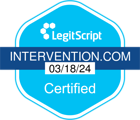Discovering that a loved one is entangled in the shackles of substance abuse can be a heart-wrenching reality to face. It’s an uphill battle, fraught with emotional turmoil, uncertainty, and the dire need for professional guidance. As someone invested in the welfare of a cherished one, taking the first step towards pulling them back from the abyss of addiction is fundamental.
This guide will walk you through the steps on how to hire an interventionist, a crucial ally in your loved one’s journey toward recovery. With Intervention.com by your side, you’re not alone in this. Let’s embark on this path together.
What is the Role of an Interventionist?
An interventionist serves as a beacon of light, guiding individuals through the often tumultuous path of addressing alcohol or drug addiction. Their role is to provide professional guidance and a structured approach toward confronting the individual struggling with addiction, while nurturing a safe and constructive environment. The significance of their expertise cannot be overstated as they are adept at addressing the challenging emotional dynamics that addiction entails.
Building a Support Circle
A crucial part of the intervention process is assembling a support circle comprising family, friends, and loved ones. Your interventionist is instrumental in this phase, helping identify and mobilize a network of individuals who care deeply and are committed to the cause. This circle provides moral support and reinforces the message of change, forming a united front against the harrowing clutches of addiction.
Educating the Intervention Team
Your interventionist will orchestrate pre-intervention meetings to educate the support circle on the intervention process, what to expect, and how to navigate potential roadblocks. Addressing concerns, fears, and misconceptions head-on, they equip you with the necessary tools and understanding to approach the intervention with confidence and a clear roadmap.
Facilitating The Intervention
Your interventionist, acting as a neutral mediator, facilitates a respectful dialogue between the individual and the support circle on the day of the intervention. Their expertise ensures the conversation remains focused, respectful, and constructive, keeping the ultimate goal of acceptance and treatment within sight.
Post-Intervention Guidance
The intervention is only the first step on the long road to recovery. Post-intervention, your trusted interventionist continues to offer invaluable support and guidance for both the individual and the family. They help map out the subsequent steps, whether it’s detox, therapy, or other recovery plans, ensuring you are well-equipped to traverse the path to sobriety.
When to Consider Hiring an Interventionist?

You’ve probably noticed some unsettling changes in your loved one — a shift in their behavior, secretive actions, or perhaps a decline in their health and well-being due to eating disorders. Recognizing the addiction signs and behaviors is the first step.
Yet, it’s not always crystal clear. Sometimes, families try to stage their interventions, believing that sheer love and willpower can pull their dear ones out of the abyss. Sadly, many face challenges: emotionally charged confrontations, denial, or even worsening the addicted individual’s behavior. It’s heartbreaking and often counterproductive.
That is where the expertise of an interventionist becomes invaluable. Waiting for a “rock bottom” moment can be too late. Being proactive, with the aid of a professional, might just be the catalyst for turning things around.
What are the Steps to Hiring an Interventionist?
The journey towards staging an intervention starts long before the day itself, and it commences with acknowledging the severe need for professional guidance. Here’s how to navigate through this process:
Recognize the Need
You might have been noticing some alarming signs but brushing them off, hoping things would improve. Discerning the difference between casual substance use and a burgeoning addiction is essential. If you’re losing sleep over a loved one’s destructive behavior, it’s a clear sign that professional help is necessary. Accepting the gravity of the situation is your first stride toward a solution.
Research and Shortlist Professionals
Your next step is delving into some research. A great starting point is consulting reputable professional organizations in the intervention field. Look for interventionists with the proper credentials and ample experience. Remember, not all interventionists are created equal; picking a certified and seasoned professional could make a significant difference in the effectiveness of the intervention.
Interview Potential Interventionists
Once you have a shortlist, it’s time to get on the phone or meet in person. Ask about their experience, methodology, and success rate. It’s also crucial to gauge how comfortable you feel with them. Are their values aligned with yours? Do they exhibit empathy, understanding, and a structured approach towards addiction? Your loved one’s future could hinge on making the right choice, so take your time to make an informed decision.
Coordinate and Plan the Intervention
With the proper interventionist by your side, you’ll orchestrate a well-structured and impactful intervention. Your interventionist will prepare you and your family on what to expect, how to communicate effectively, and how to react to possible scenarios. Coordinating the logistics, setting the right tone, and preparing emotionally for the intervention are crucial steps to ensure a successful outcome.
What are the Benefits of Hiring an Interventionist?

Hiring an interventionist offers a multitude of benefits that not only address the addiction but also provide a support system for everyone involved. Here’s what you stand to gain:
- Professional Guidance: An interventionist brings a wealth of knowledge and expertise, guiding families through a process they might not be familiar with. This ensures the intervention is structured and effective.
- Neutral Mediator: Emotions can run high during interventions. A professional serves as an impartial mediator, ensuring conversations remain constructive and centered on recovery.
- Educational Insight: Before the intervention, families are educated about addiction, creating a well-informed support circle that understands the dynamics at play.
- Higher Success Rate: With their experience, interventionists increase the likelihood of the individual accepting help, compared to self-orchestrated interventions.
- Professional Networking: Interventionists have connections with treatment centers and can facilitate a smooth transition into a rehabilitation program, ensuring continuity of care.
- Pre- and Post-Intervention Support: Their role isn’t just limited to the intervention. They provide crucial guidance before and map out subsequent steps after the intervention.
Frequently Asked Questions (FAQs)
1. How do I know if the interventionist is the right fit for our situation?
It’s crucial to have an interventionist who resonates with the family’s values and understands the unique dynamics at play. During the interview process, gauge their approach, experience, and ensure they have a sound plan tailored to your loved one’s needs.
2. How long does the whole process of intervention take?
The length can vary significantly depending on the complexity of the situation and the individual’s readiness to accept help. It might take days or even weeks of preparation, followed by the intervention itself, and the subsequent transition into treatment.
3. What happens if the intervention is unsuccessful?
Not every intervention leads to acceptance of treatment. However, it’s a step toward making the individual aware of the gravity of their situation. Continued support, love, and a follow-up intervention could be the course of action.
4. How do we ensure the confidentiality of the intervention process?
Professional interventionists uphold strict ethical standards. Respecting client confidentiality is paramount. Rest assured, details of the intervention, and any shared personal information remain private and protected.
5. What should be the ideal location for an intervention?
The location should be non-threatening and comfortable for the individual. It could be a home, a neutral family friend’s place, or even a professional setting recommended by the interventionist.
Find an Interventionist Near You
Every step you take towards seeking professional intervention is a stride toward the hope of recovery and a brighter future for your loved one. At Intervention.com, we believe in the power of collective strength and are here to be your pillar of support.
Time is of the essence when confronting addiction. Don’t let another second slip away. Click the button below to connect with our vast network of certified interventionists and get immediate assistance tailored to your situation. Let’s embark on this journey to healing together!

